[vc_row][vc_column][vc_single_image image=”949″ img_size=”full” alignment=”center”][vc_custom_heading text=”“A Piece of My Mind”” font_container=”tag:h1|font_size:50px|text_align:center|color:%232633ef” google_fonts=”font_family:Bitter%3Aregular%2Citalic%2C700|font_style:700%20bold%20regular%3A700%3Anormal”][vc_custom_heading text=”July-August 2021 Newsletter” font_container=”tag:h1|font_size:30px|text_align:center|color:%232633ef” google_fonts=”font_family:Bitter%3Aregular%2Citalic%2C700″][/vc_column][/vc_row][vc_row][vc_column width=”2/3″][vc_column_text]
Advancing Christian Faith and Values,
Defending Religious Liberty for All,
Supporting Civility and the Common Good
through Preaching, Teaching, Writing, Activism and Reasoned Conversations
www.donaldshoemakerministries.com[/vc_column_text][/vc_column][vc_column width=”1/3″][vc_single_image image=”1304″ img_size=”full” alignment=”center”][/vc_column][/vc_row][vc_row css=”.vc_custom_1598373738095{border-radius: 3px !important;}”][vc_column][vc_column_text]
Coping with Life’s Uncertainties
 Now listen, you who say, “Today or tomorrow we will go to this or that city, spend a year there, carry on business and make money.” Why, you do not even know what will happen tomorrow. What is your life? You are a mist that appears for a little while and then vanishes.
Now listen, you who say, “Today or tomorrow we will go to this or that city, spend a year there, carry on business and make money.” Why, you do not even know what will happen tomorrow. What is your life? You are a mist that appears for a little while and then vanishes.
Instead, you ought to say, “If it is the Lord’s will, we will live and do this or that.”
– James 4:13-15 (NIV)
[/vc_column_text][vc_column_text]
Message of the Month – Coping with Life’s Uncertainties
Legendary Dodger broadcaster Vin Scully once said, “If you want to make God laugh, tell him your plans.”
Every time I open my i-Pad I’m greeted by a picture from our wonderful 50th anniversary Alaskan cruise in June 2016. Mary and I never planned on “55” being that glamorous, but we did talk ideas. Concern about travel and Covid put the planning on hold. And those plans wouldn’t have come to fruition anyway because right before our anniversary I was in the hospital.
It started with a wake-up pain in the middle of the night that I recognized—I might be passing a kidney stone. The stone was confirmed in the emergency room and later that morning I went home. This was repeated the next week.
Finally an urologist told me to go to the hospital for admission. I didn’t know I also had bleeding ulcers that were exhausting my strength. I was sitting on the side of an emergency room bed when next thing I knew the room was full of medical personnel bringing me back to reality.
After lots of effective treatment and good care and good food (I didn’t eat the first two days), I came home. Our anniversary was enjoyed at home with dinner delivered from a local restaurant. Future treatments are being lined up for July and after.
The episode has given me pause to think about life and its uncertainties.
First, as I told the hospital chaplain, I give thanks to God all the more for the excellent health I’ve enjoyed throughout my entire 76 years.
Second, thanks to God and heart-felt appreciation to my wife, Mary, and my family—for her incredible care and assistance and their support at every turn.
Third, I was reminded (as the above scripture teaches) that planning has its place but God holds the veto. He has his purposes and I probably won’t have insight into them beyond the ultimate assurance that “all things work together for good to them who love God, to them who are the called according to his purpose” (Romans 8:28 – the King James Version gives a better “read” on the meaning of this verse than some modern translations do).
My plans for the future must factor in God’s purposes (“if the Lord wills”) and my own human frailty (“you are a mist that appears for a little while and then vanishes”). I am honoring God, showing faith, and facing reality honestly when I preface the big plans with “If the Lord wills…” It goes without saying, God’s moral will for my life must also be factored into the plans I make.
Fourth, I’ve come to a deeper appreciation for those who work in health care, especially at the level of hospitalization. Theirs has not been an easy 18 months. Their work runs the gamut from what requires highly skilled training to things most mundane if not most unpleasant. They do it over and over, and do it well.
Fifth, I need to listen to this marvelous body the Lord has given me. There were signs that things were not OK. It’s easy to brush these aside with a “this too shall pass” attitude. No, we need to listen to our bodies.
Sixth, be reminded that each day may be our final chance to make amends, set things right, express love we’ve suppressed, make that call or send that message and more. And are our earthly affairs set in order? The Psalmist prayed, “Teach us to number our days” (Psalm 90:12), that is, treat each day as significant.
Seventh, I believe more than ever in God’s willingness to minister blessing to us in response to prayer. To the point, “Therefore confess your sins to each other and pray for each other so that you may be healed. The prayer of a righteous person is powerful and effective” (James 5:16 NIV). Thanks to all who prayed for me.
Since being home I’ve enjoyed waking up and while still in bed singing hymns like, “Praise God from whom all blessings flow” or “Holy, Holy, Holy, Lord God Almighty! Early in the morning my song shall rise to Thee” or “When morning guilds the skies, my heart awakening cries, ‘May Jesus Christ be praised!’”
In the morning, Lord, you hear my voice;
In the morning I lay my requests before you and wait expectantly.
– Psalm 5:3
[/vc_column_text][vc_row_inner][vc_column_inner][vc_column_text]
Religious Liberty Vigilance –
The Liberty Bell and the Power of Scripture
 We hold these truths to be self-evident, that all men are created equal, that they are endowed by their Creator with certain unalienable Rights, that among these are Life, Liberty and the pursuit of Happiness. – That to secure these rights, Governments are instituted among Men, deriving their just powers from the consent of the governed…
We hold these truths to be self-evident, that all men are created equal, that they are endowed by their Creator with certain unalienable Rights, that among these are Life, Liberty and the pursuit of Happiness. – That to secure these rights, Governments are instituted among Men, deriving their just powers from the consent of the governed…
– The Declaration of Independence, July 4, 1776
“Can the liberties of a nation be thought secure when we have removed their only firm basis, a conviction in the minds of the people that these liberties are the gift of God?
– Thomas Jefferson, “Notes on the State of Virginia”
The “Liberty Bell” was commissioned in 1752 by the Pennsylvania Assembly. It was cast by the London firm of Lester and Pack and was lettered: “Proclaim LIBERTY Throughout all the Land unto all the Inhabitants Thereof.”
The quote is from Leviticus 25:10. In its context, it is truly a call for liberty throughout Israel—spiritual liberty, yes, but with teeth in it that affected the land (giving it time to rejuvenate) and how people must treat people and release those enslaved to bondage. (Read Leviticus 25.)
In the 1830’s the bell with its message took on a deeper significance as a symbol of abolitionism. If we “proclaim liberty throughout all the land unto all the inhabitants thereof,” we must not exclude those who are enslaved.
We recently celebrated the meaning of “Juneteenth,” commemorating when General Gordon Granger and his troops arrived in Galveston, Texas in 1865 to proclaim the end of the last vestige of American slavery—Texas yet had 250,000 slaves. (But we can’t ignore today’s underground slavery in the U.S.)
Whenever we think of the Liberty Bell and the implications of its biblical quotation, from now on we will remember what happened in Galveston. In our hearts perhaps we hear the bell ringing and remember the scripture.
 [/vc_column_text][/vc_column_inner][/vc_row_inner][vc_row_inner][vc_column_inner][vc_column_text]
[/vc_column_text][/vc_column_inner][/vc_row_inner][vc_row_inner][vc_column_inner][vc_column_text]
 On the American Revolution and Slavery
On the American Revolution and Slavery
(in the face of some revisionist theories today)
Far from retarding the abolition of slavery, the Revolution actually accelerated it. Its triumph gave a big boost to Enlightenment liberalism, which inspired the First Emancipation in the US (the abolition of slavery in the North that became the first large-scale emancipation of slaves in modern history), and boosted antislavery movements in Europe, as well…
For all their failings, the Revolution and Founding paved the way for abolition. That happened in large part because they were the first large-scale effort to establish a polity based on universal liberal principles rather than ties of race, ethnicity, or culture.
Those principles are at the root of most of America’s achievements, of which the abolition of slavery was perhaps the most important. They are also what enabled America, at its best, to offer freedom and opportunity to people from a wide range of racial and ethnic backgrounds from all over the world.
– Ilya Somin, “Juneteenth and the Universalist Principles of the American Revolution”, The Volokh Conspiracy, June 19, 2021
Doctrinal Thoughts from a Milestone Document
Exactly 100 years ago The Brethren Church (forerunner of my denomination today) adopted a document known as:
“The Message of the Brethren Ministry”
It was not a creed per se and wasn’t binding on Brethren churches. But it did set forth the viewpoint of Brethren ministers on nine points of doctrine. It was adopted by the denomination’s ministerial association in 1921. Here are the nine key points [my comments in brackets]:
We understand the basic content of our doctrinal preaching and teaching to be:
1. The pre-existence, deity and incarnation by virgin birth of Jesus Christ, the Son of God.
2. The fall of all people [humanity’s fall “in Adam” in Genesis 3], their consequent spiritual death and utter sinfulness, and the necessity of their new birth;
3. The vicarious atonement of the Lord Jesus Christ through the shedding of His own blood. [“Vicarious” is not commonly used today. “Substitutionary” – Jesus died in my stead, bearing my sin, obtaining my forgiveness – is common now.]
4. The resurrection of the Lord Jesus Christ in the body in which He suffered and died and His subsequent glorification at the right hand of God.
5. Justification by personal faith in the Lord Jesus Christ, of which obedience to the will of God and works of righteousness are evidence and result; the resurrection of the dead, the judgment of the world and the life everlasting of the just;
6. The personality and deity of the Holy Spirit who indwells the Christian and is a personal comforter and guide;
7. The personal and visible return of our Lord Jesus Christ from heaven as King of Kings and Lord of Lords; the glorious goal for which we are taught to wait, watch and pray;
8. The Christian should “be not conformed to this world but be transformed by the renewing of the mind”; should not engage in car¬nal strife, and should “swear not at all” [the last two phrases now obscure how they were then understood: Christians should not “bear arms” in military conflict and must not swear oaths in court or elsewhere to support the veracity of their words.];
9. The Christian should observe, as a duty and privilege, the ordinances of our Lord Jesus Christ, among which are (a) baptism of believers by triune immersion; (b) confirmation; (c) the Lord’s supper; (d) the communion of bread and wine; (e) the washing of the saint’s feet; and (f) the anointing of the sick with oil. [These points might be called “denominational distinctives”; they are worthy of discussion but a word on each would far exceed the scope of these pages.]
The nine statements have served us well. They are concise, rather clear, continually relevant, and mostly address critical issues of the faith rather than minor or denominational issues. Contrary to our earlier aversion to church creeds, they were actually adopted by the “Grace Brethren” in 1938 as a statement of faith until they were replaced by a new statement in 1969.
Here is a call I issued in the year 2000 pertaining to point #7 on the Second Coming of Christ, a call I strongly reaffirm today (published in Sharpening One Another, a publication of the Association of Grace Brethren Ministers):
Grace Brethren Eschatology:
Where Should Our Fellowship Go?
By Dr. Donald P. Shoemaker, Senior Pastor
Grace Community Church (FGBC) of Seal Beach, California
In 1921, Dr. Alva J. McClain authored “The Message of the Brethren Ministry,” setting forth the common beliefs of the Brethren ministers of that day. The statement has been a defining document of our movement ever since and was endorsed by the General Conference in 1938.
This is the eschatology statement of “The Message”:
The personal and visible return of our Lord Jesus Christ from Heaven as King of Kings and Lord of Lords, the glorious goal for which we are taught to watch, wait and pray.
Since the summary of our beliefs is always a current statement of a never-ending process (this side of Glory) to articulate truth, rather than a statement of our perfect understanding of truth, I believe the time has come for us to revisit our current position on eschatology. Specifically, I propose it is time for us to extend latitude toward more than one evangelical option on how the Rapture of the Church relates to the Tribulation Period.
Here are some reasons for my thinking…
(1) Belief in a pre-tribulation rapture is neither an essential part of historic Christian confessions nor (either in breadth or duration) of the belief patterns of the Brethren throughout our history.
(2) The notion of a 7-year tribulation rises from only one interpretation, among many viable ones, of Daniel 9:25-27, an apocalyptic passage notoriously cryptic.
(3) The pre-tribulation rapture is generally defended along inferential lines rather than from relatively straightforward statements of the biblical text.
(4) Creating our identity around a fine point of eschatology and separating from other Christians over such a fine point seem contrary to “maintaining the unity of the Spirit” in the Body of Christ.
(5) The study of eschatology is by nature a tentative exercise, especially the more we refine our position beyond the fundamental points of a Second Advent, resurrection, judgment and eternal state.
(6) Twentieth-century “Dispensationalism” has undergone modifications in recent years that have called into debate some of its features previously thought to be “necessary.”
(7) A confidential survey of Grace Brethren ministers in 1982 found that a sizeable minority of ministers confessed varying degrees of reservation over our stated position on a pre-tribulation rapture. The number of ministers with reservations has most likely increased since 1982. A spirit of honest inquiry on matters not foundational to our faith as Christians is best done in an unthreatening and brotherly context where we can be “free to disagree.”
(8) Our witness to our world and our expression of our self-identity should focus on the major themes that separate “light from darkness” (or at least they should express major theological themes) rather than peripheral or tangential areas where godly, conscientious Christians have differences.
So I would pose the question, “Is now the time for us to identify ourselves more with the historical Christian hope and with the Evangelical mainstream in our eschatology?” A return to Dr. McClain’s articulate words could be a good step in that direction.[/vc_column_text][/vc_column_inner][/vc_row_inner][/vc_column][/vc_row][vc_row css=”.vc_custom_1598373738095{border-radius: 3px !important;}”][vc_column][vc_column_text]
 What Are the Most Empty Words We Use?
What Are the Most Empty Words We Use?
I mean, yeah, there are lots of empty and thoughtless words. These words may, you know, be meaningless, habitual, worn out, or demeaning. OK?
But what word or words are truly the worst? Could it be that comment when people just can’t prove their point so they say, “It is what it is”? Or what the server at the restaurant says each time an item is brought to the table, even a straw—“There you go”?
Perhaps it’s the dismissive word “whatever.” It flippantly treats the point being discussed as trivial and discardable, as if of no consequence. It diminishes the other person in the communication.
Right?
But maybe you, like, disagree with me and want to “throw me under the bus.” Look, Uncle Joe has something to say to you: “C’mon, man!”
 Our Little 2021 Contribution to Creation
Our Little 2021 Contribution to Creation
Monarch butterflies are having it tough these days. We thought we’d become pro-active in adding to their number. (My wife has done most of the work!)
We’ve amply supplied the yard with essential milkweed plants, once driving many miles to get some. There the eggs are laid and the larvae eat so voraciously. We’ve provided safe places for the larva and chrysalis stages. When the butterflies emerge from their cocoons we give them a couple of days of protection for gaining strength and then we release them.
This season we’ve released 37 butterflies into nature and lost only a very few which didn’t fully develop or were diseased.
A Good Word from Elsewhere…
Hate Speech and the Death of Philosophy
By Donald DeMarco, professor emeritus of Saint Jerome’s University and an adjunct professor at Holy Apostles College and Seminary. From Crisis Magazine, June 7, 2021.
One of the most important distinctions we can make during these troubled times is between philosophy and ideology. PHILOSOPHY is the search for truth employing the universal human faculty of reason. Therefore, philosophy is for everyone.
An IDEOLOGY, on the other hand, is limited to a set of ideas that does not have a universal scope. Consequently, an ideology is not for everyone, but rather for the relatively few who agree with its tenets. Aristotle, Plato, Aquinas, Maritain, and Gilson are philosophers. Nothing is excluded from their range of thought. Marxism, Freudianism, Darwinism, and Feminism are ideologies. Marx builds his ideology on economics, Freud on psychology, Darwin on biology, Feminism on the female sex. Each of these ideologies is lacking in breadth.
An ideology has a certain claim to respectability because it purports to improve society and culture. Nonetheless, because of its limited purview, it is inherently incompatible, even antagonistic, to philosophy… An ideology barricades itself against dialogue with a philosophical viewpoint. In fact, it is often hostile toward philosophy. It is a defense system, not an outreach.
How important is philosophy to society? We should heed the words of Étienne Gilson, who warned that “If we lose philosophy itself; we must be prepared to lose science, reason, and liberty; in short, we are bound to lose Western culture itself together with its feeling for the eminent dignity of man.”
We need philosophy to learn about the breadth of reality, not a mere fragment; to understand the nature of the human being and not settle for an ideological construct; to provide a basis for all people to live together in harmony, not merely a select few. The task of the philosophy teacher is to make virtue attractive to his students and evil repulsive—and to show his future legislators that philosophy, more than any ideology, contains the best promise for a better world.[/vc_column_text][/vc_column][/vc_row][vc_row css=”.vc_custom_1598373738095{border-radius: 3px !important;}”][vc_column][vc_column_text]
www.donaldshoemakerministries.com
Contact me at: donaldshoemakerministries@verizon.net
Don has been a member of the clergy in the Long Beach CA area since 1970. He serves currently as Pastor Emeritus of Grace Community Church of Seal Beach (where he was senior pastor 1984-2012) and as Senior Chaplain of the Seal Beach Police Department (2001+). He previously was an assistant professor of Biblical Studies at Biola University and chaired the Social Concerns Committee in the Fellowship of Grace Brethren Churches from 1985 to 2019. His graduate work includes a master’s degree in theology from Fuller Theological Seminary with a concentration in Christian ethics, and a doctor of ministry degree from American Baptist Seminary of the West with a concentration on the modern Charismatic Movement. He and his wife Mary have been married for 55 years. They have two children and six grandchildren.[/vc_column_text][/vc_column][/vc_row]


 Touch is more than one of the five senses. When welcomed, it is a vital part of human interaction. Unwelcomed, it is an intrusion or worse.
Touch is more than one of the five senses. When welcomed, it is a vital part of human interaction. Unwelcomed, it is an intrusion or worse. 107-year-old Viola Fletcher, the oldest living survivor of the massacre testified at a recent congressional hearing on “The Centennial of the Tulsa-Greenwood Race Massacre.”
107-year-old Viola Fletcher, the oldest living survivor of the massacre testified at a recent congressional hearing on “The Centennial of the Tulsa-Greenwood Race Massacre.” Jesus loves the little children,
Jesus loves the little children, “Broken Windows” was the metaphor for the smaller deterioration—vandalism, public drinking, “fare-hopping,” disorderly conduct, petty thefts, criminal trespass, graffiti, letting trash accumulate, poor maintenance of property, and more.
“Broken Windows” was the metaphor for the smaller deterioration—vandalism, public drinking, “fare-hopping,” disorderly conduct, petty thefts, criminal trespass, graffiti, letting trash accumulate, poor maintenance of property, and more. May your father and mother rejoice;
May your father and mother rejoice;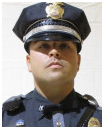
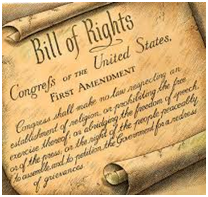 “I consider the government of the United States as interdicted by the Constitution from inter meddling with religious institutions, their doctrines, discipline, or exercises.”
“I consider the government of the United States as interdicted by the Constitution from inter meddling with religious institutions, their doctrines, discipline, or exercises.”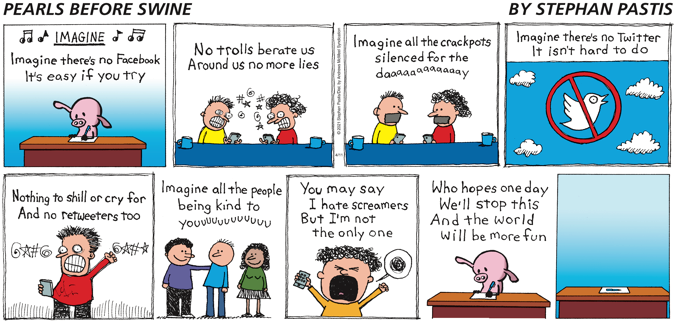
 —Jason D. Hill, Professor of Philosophy at DePaul University. Dr. Hill emigrated from Jamaica in 1985 and became an American citizen. He is the author of What Do White Americans Owe Black People (Racial Justice in the age of post-oppression) and Civil Disobedience and the Politics of Identity.
—Jason D. Hill, Professor of Philosophy at DePaul University. Dr. Hill emigrated from Jamaica in 1985 and became an American citizen. He is the author of What Do White Americans Owe Black People (Racial Justice in the age of post-oppression) and Civil Disobedience and the Politics of Identity. Our Easter Hope – Resurrection to New Life
Our Easter Hope – Resurrection to New Life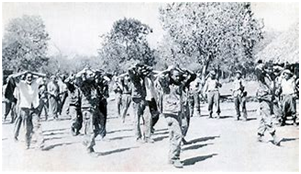 Victory was not to be. Within three days the invaders were defeated and most were captured. Kennedy had cancelled plans for air cover, dooming the operation.
Victory was not to be. Within three days the invaders were defeated and most were captured. Kennedy had cancelled plans for air cover, dooming the operation.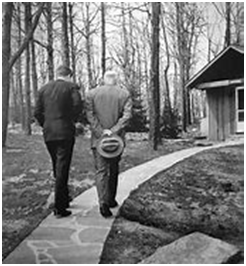 Kennedy took full responsibility for the failure. Especially poignant, two days after the collapse of the invasion Kennedy invited Dwight Eisenhower to Camp David to get, as Kennedy later told the press, “the benefit of his thoughts and experience.”
Kennedy took full responsibility for the failure. Especially poignant, two days after the collapse of the invasion Kennedy invited Dwight Eisenhower to Camp David to get, as Kennedy later told the press, “the benefit of his thoughts and experience.”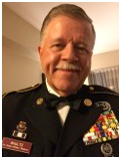 Why the Spike in Crime?
Why the Spike in Crime?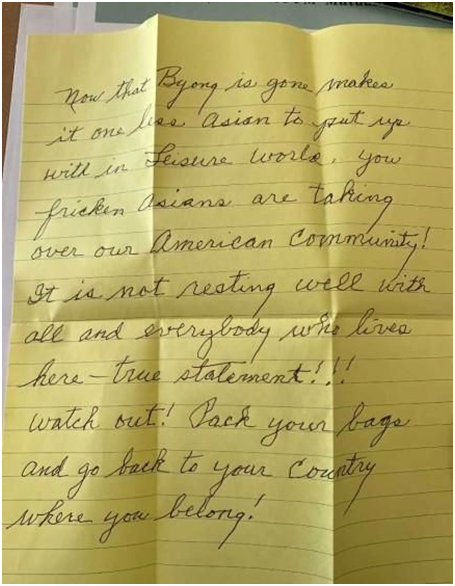 The community has come together in reaffirming this resident’s right to live in
The community has come together in reaffirming this resident’s right to live in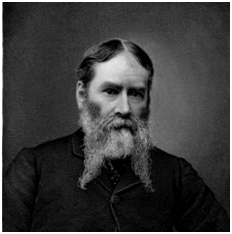
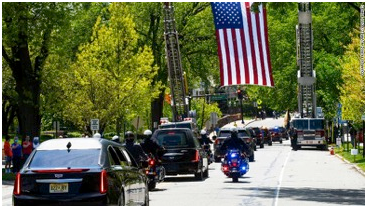 Back The Badge
Back The Badge Captain Jonathan Parnell of the Detroit Police Department was the first to die of COVID on March 24. The last, on December 31, was Officer Troy Adkins, U.S. Department of Homeland Security – Customs and Border Protection. In between, 208 LODD were from COVID-19. A distant second was gunfire (50), followed by automobile crashes (20) and vehicular assault (13). *
Captain Jonathan Parnell of the Detroit Police Department was the first to die of COVID on March 24. The last, on December 31, was Officer Troy Adkins, U.S. Department of Homeland Security – Customs and Border Protection. In between, 208 LODD were from COVID-19. A distant second was gunfire (50), followed by automobile crashes (20) and vehicular assault (13). *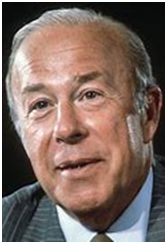 George Shultz, who died February 6 at the age of 100, was secretary of state to President Reagan, among other roles. He was most instrumental in ending the Cold War.
George Shultz, who died February 6 at the age of 100, was secretary of state to President Reagan, among other roles. He was most instrumental in ending the Cold War.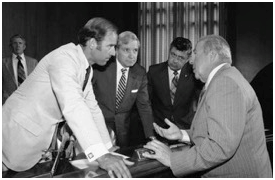 eliminate these weapons in order to preserve a sane and peaceful world. We pray for your help as we work toward this goal.”
eliminate these weapons in order to preserve a sane and peaceful world. We pray for your help as we work toward this goal.”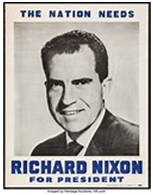 Richard Nixon and the Election of 1960
Richard Nixon and the Election of 1960 I’m also impressed with how Daniel earned the right to be heard, even to be able to tell a proud and ruthless king what he didn’t want to hear. After Daniel told the king the dream’s warning of his impending insanity, Daniel held out a word of hope: “Therefore, O king, be pleased to accept my advice: Renounce your sins by doing what is right, and your wickedness by being kind to the oppressed. It may be that then your prosperity will continue” (4:27).
I’m also impressed with how Daniel earned the right to be heard, even to be able to tell a proud and ruthless king what he didn’t want to hear. After Daniel told the king the dream’s warning of his impending insanity, Daniel held out a word of hope: “Therefore, O king, be pleased to accept my advice: Renounce your sins by doing what is right, and your wickedness by being kind to the oppressed. It may be that then your prosperity will continue” (4:27).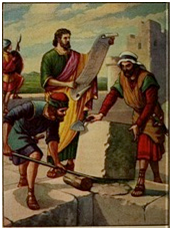 Nehemiah was greatly distressed when he heard that the walls of far-away Jerusalem lay in ruins—the place that was once King David’s royal city. This was around 444 BC, a century after the end of the Babylonian Captivity. With permission and provisions from the king, Nehemiah travelled to Jerusalem, rebuilt the walls, restored a sense of community in the city, protected the people from surrounding enemies, and revitalized worship and obedience to God.
Nehemiah was greatly distressed when he heard that the walls of far-away Jerusalem lay in ruins—the place that was once King David’s royal city. This was around 444 BC, a century after the end of the Babylonian Captivity. With permission and provisions from the king, Nehemiah travelled to Jerusalem, rebuilt the walls, restored a sense of community in the city, protected the people from surrounding enemies, and revitalized worship and obedience to God.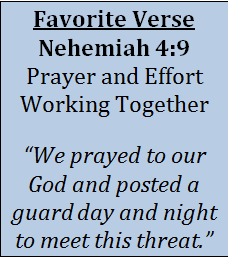 Moreover, Nehemiah did not eat the food allotted to him as governor, thus relieving the tax burden placed on the people by earlier governors. “Out of reverence for God I did not act like that” (5:15). What Nehemiah did do was to invite people to eat at his table—150 of them at a time! And eat well they did—oxen, sheep and poultry with an abundant supply of wine. But Nehemiah refused to tax the people for his culinary enjoyments.
Moreover, Nehemiah did not eat the food allotted to him as governor, thus relieving the tax burden placed on the people by earlier governors. “Out of reverence for God I did not act like that” (5:15). What Nehemiah did do was to invite people to eat at his table—150 of them at a time! And eat well they did—oxen, sheep and poultry with an abundant supply of wine. But Nehemiah refused to tax the people for his culinary enjoyments.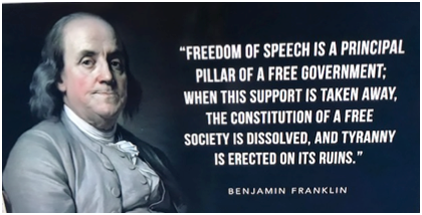 The freedoms of religion, speech, the press, peaceful assembly and petition of government are all guaranteed in the First Amendment. I see these freedoms standing or falling together.
The freedoms of religion, speech, the press, peaceful assembly and petition of government are all guaranteed in the First Amendment. I see these freedoms standing or falling together.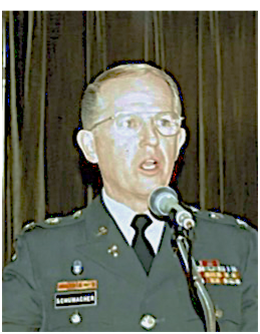 “A Soldier of God” –
“A Soldier of God” –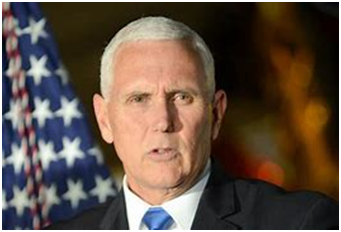 A Man of Honor and Courage
A Man of Honor and Courage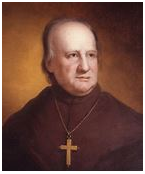 A Timely Prayer for our Country—
A Timely Prayer for our Country— When we moved to California in 1970 and bought a home, we noticed the previous owner left behind an old copy of LIFE magazine—from 1965—titled “Drama of Life Before Birth.” For you younger ones, LIFE magazine was probably the premier periodical of that day. That issue of LIFE would change the focus of my ministry!
When we moved to California in 1970 and bought a home, we noticed the previous owner left behind an old copy of LIFE magazine—from 1965—titled “Drama of Life Before Birth.” For you younger ones, LIFE magazine was probably the premier periodical of that day. That issue of LIFE would change the focus of my ministry! Good News from Grace
Good News from Grace I continue to marvel at the loyalty of these people as evidenced by their giving in the midst of this time of economic, social and medical difficulty:
I continue to marvel at the loyalty of these people as evidenced by their giving in the midst of this time of economic, social and medical difficulty: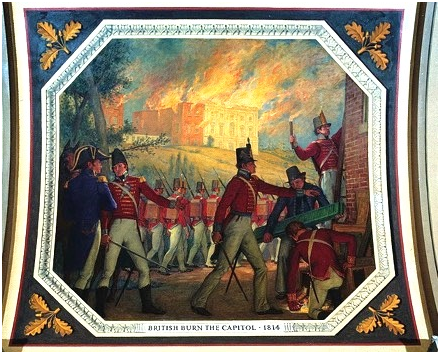 Losing “The Peoples’ Capitol”
Losing “The Peoples’ Capitol”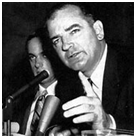 Beware “The New McCarthyism”
Beware “The New McCarthyism” “Mobocracy” is authoritarian, unchristian, and contrary to American ideals, whether it is by leftist extremists or right-wing extremists.
“Mobocracy” is authoritarian, unchristian, and contrary to American ideals, whether it is by leftist extremists or right-wing extremists.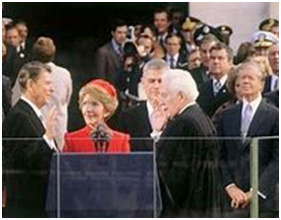
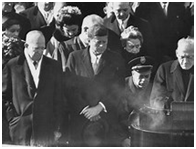 While Cardinal Cushing was giving the invocation the podium began to smoke. My grandmother was living with us at the time, and her choice words were, “Holy smoke!” The good cardinal’s prayer was so long that California Gov. Pat Brown leaned over to another and said, “If he doesn’t quit now, I’m leaving the church!”[/vc_column_text][/vc_column][/vc_row][vc_row css=”.vc_custom_1598373738095{border-radius: 3px !important;}”][vc_column width=”1/4″][vc_single_image image=”1542″ img_size=”full” alignment=”center”][/vc_column][vc_column width=”1/2″][vc_column_text]The day featured 22-degree temperature, 8 inches of snow, and bright sunlight. Poet Robert Frost couldn’t read his poem in the bright sun, so his text was shaded by Lyndon Johnson’s hat. Speaking of hats, JFK and others wore high hats to the distinguished occasion.[/vc_column_text][/vc_column][vc_column width=”1/4″][vc_single_image image=”1543″ img_size=”full” alignment=”center”][/vc_column][/vc_row][vc_row css=”.vc_custom_1598373738095{border-radius: 3px !important;}”][vc_column width=”1/4″][vc_single_image image=”1544″ img_size=”full” alignment=”center”][/vc_column][vc_column width=”1/2″][vc_column_text]Things seemed more amicable and civil than today. President Eisenhower is comfortable between the President-elect and his wife. Defeated presidential candidate and Vice President Richard Nixon observes at the far right.[/vc_column_text][/vc_column][vc_column width=”1/4″][vc_single_image image=”1545″ img_size=”full” alignment=”center”][/vc_column][/vc_row][vc_row css=”.vc_custom_1598373738095{border-radius: 3px !important;}”][vc_column][vc_column_text]
While Cardinal Cushing was giving the invocation the podium began to smoke. My grandmother was living with us at the time, and her choice words were, “Holy smoke!” The good cardinal’s prayer was so long that California Gov. Pat Brown leaned over to another and said, “If he doesn’t quit now, I’m leaving the church!”[/vc_column_text][/vc_column][/vc_row][vc_row css=”.vc_custom_1598373738095{border-radius: 3px !important;}”][vc_column width=”1/4″][vc_single_image image=”1542″ img_size=”full” alignment=”center”][/vc_column][vc_column width=”1/2″][vc_column_text]The day featured 22-degree temperature, 8 inches of snow, and bright sunlight. Poet Robert Frost couldn’t read his poem in the bright sun, so his text was shaded by Lyndon Johnson’s hat. Speaking of hats, JFK and others wore high hats to the distinguished occasion.[/vc_column_text][/vc_column][vc_column width=”1/4″][vc_single_image image=”1543″ img_size=”full” alignment=”center”][/vc_column][/vc_row][vc_row css=”.vc_custom_1598373738095{border-radius: 3px !important;}”][vc_column width=”1/4″][vc_single_image image=”1544″ img_size=”full” alignment=”center”][/vc_column][vc_column width=”1/2″][vc_column_text]Things seemed more amicable and civil than today. President Eisenhower is comfortable between the President-elect and his wife. Defeated presidential candidate and Vice President Richard Nixon observes at the far right.[/vc_column_text][/vc_column][vc_column width=”1/4″][vc_single_image image=”1545″ img_size=”full” alignment=”center”][/vc_column][/vc_row][vc_row css=”.vc_custom_1598373738095{border-radius: 3px !important;}”][vc_column][vc_column_text]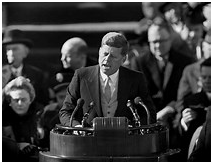 President Kennedy’s brief inaugural speech was a classic, to be long remembered. You may know “Ask not what your country can do for you…” and “We shall pay any price, bear any burden…” Also very important:
President Kennedy’s brief inaugural speech was a classic, to be long remembered. You may know “Ask not what your country can do for you…” and “We shall pay any price, bear any burden…” Also very important: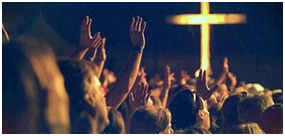 These things I remember, as I pour out my soul:
These things I remember, as I pour out my soul: John is a colleague of mine in Christian Ministry. He is a careful thinker whose mind often “colors outside the lines.” Here are excellent thoughts from one who (like me) lived in the 1950’s and 60’s and often viewed the world through that lens.
John is a colleague of mine in Christian Ministry. He is a careful thinker whose mind often “colors outside the lines.” Here are excellent thoughts from one who (like me) lived in the 1950’s and 60’s and often viewed the world through that lens. –Picture from The Wall Street Journal, December 18, 2020
–Picture from The Wall Street Journal, December 18, 2020
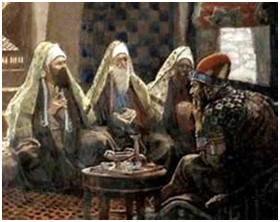 This Herod ruled for 37 years. Readers of the Bible meet him in the Gospel of Matthew, when the Magi approach him with the question, “Where is he who is born King of the Jews? We have seen his star in the east and have come to worship him” (Matthew 2:3).
This Herod ruled for 37 years. Readers of the Bible meet him in the Gospel of Matthew, when the Magi approach him with the question, “Where is he who is born King of the Jews? We have seen his star in the east and have come to worship him” (Matthew 2:3). We meet Herod the Tetrarch one more time, when the Governor, Pontius Pilate, sent Jesus to stand before him. Herod was delighted, for he had heard about Jesus and hoped Jesus would perform a miracle for him. ***
We meet Herod the Tetrarch one more time, when the Governor, Pontius Pilate, sent Jesus to stand before him. Herod was delighted, for he had heard about Jesus and hoped Jesus would perform a miracle for him. ***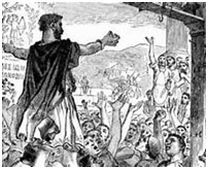 On the appointed day Herod, wearing his royal robes, sat on his throne and delivered a public address to the people. They shouted, “This is the voice of a god, not of a man.” Immediately, because Herod did not give praise to God, an angel of the Lord struck him down, and he was eaten by worms and died. (Acts 12:21-23)
On the appointed day Herod, wearing his royal robes, sat on his throne and delivered a public address to the people. They shouted, “This is the voice of a god, not of a man.” Immediately, because Herod did not give praise to God, an angel of the Lord struck him down, and he was eaten by worms and died. (Acts 12:21-23) Heaven’s arches rang when the angels sang,
Heaven’s arches rang when the angels sang, “Joe Biden, the President-elect, got more votes than any other candidate in history!”
“Joe Biden, the President-elect, got more votes than any other candidate in history!” “Donald Trump, the President-elect’s opponent, got more votes than any other opponent in history!”
“Donald Trump, the President-elect’s opponent, got more votes than any other opponent in history!”
 [/vc_column_text][/vc_column][/vc_row][vc_row css=”.vc_custom_1598373738095{border-radius: 3px !important;}”][vc_column width=”1/2″][vc_column_text]
[/vc_column_text][/vc_column][/vc_row][vc_row css=”.vc_custom_1598373738095{border-radius: 3px !important;}”][vc_column width=”1/2″][vc_column_text] At 10:58 a.m. on December 2, 2015, Syed Rizwan Farook, 28, and his wife, Tashfeen Malik, 29, entered Inland Regional Center in San Bernardino where his co-workers from the county Department of Health were having a training day and holiday party. The two opened fire, killing 14 and wounding 22 others.
At 10:58 a.m. on December 2, 2015, Syed Rizwan Farook, 28, and his wife, Tashfeen Malik, 29, entered Inland Regional Center in San Bernardino where his co-workers from the county Department of Health were having a training day and holiday party. The two opened fire, killing 14 and wounding 22 others. Fifteen minutes later, a ferocious gun battle broke out between Farook and Malik and two dozen law enforcement officers. Soon Farook and Malik were dead and a policeman was wounded.
Fifteen minutes later, a ferocious gun battle broke out between Farook and Malik and two dozen law enforcement officers. Soon Farook and Malik were dead and a policeman was wounded.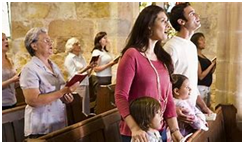 “…singing psalms and hymns and spiritual songs, with thankfulness in your hearts to God.” – Colossians 3:16 ESV
“…singing psalms and hymns and spiritual songs, with thankfulness in your hearts to God.” – Colossians 3:16 ESV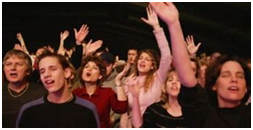 among people who, apart from their creed, may have little else in common.”
among people who, apart from their creed, may have little else in common.” Jesus turned their possession of a “denarius” (a Roman coin common for paying a day’s labor) into the principle that what belongs to Caesar should be given to him. By possessing the coin, they are implicitly acknowledging the realm of Caesar. But Jesus went beyond this to a bombshell: Caesar’s realm is one reality; the realm of God is just as real. “Render to God what is his.”
Jesus turned their possession of a “denarius” (a Roman coin common for paying a day’s labor) into the principle that what belongs to Caesar should be given to him. By possessing the coin, they are implicitly acknowledging the realm of Caesar. But Jesus went beyond this to a bombshell: Caesar’s realm is one reality; the realm of God is just as real. “Render to God what is his.”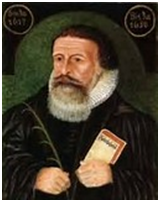 “Now Thank We All Our God”
“Now Thank We All Our God” PEARLS BEFORE SWINE © 2020 Stephan Pastis. Reprinted by permission of
PEARLS BEFORE SWINE © 2020 Stephan Pastis. Reprinted by permission of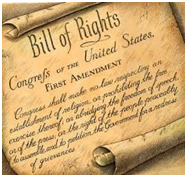 The Senators and Representatives before mentioned, and the Members of the several State Legislatures, and all executive and judicial Officers, both of the United States and of the several States, shall be bound by Oath or Affirmation, to support this Constitution; but no religious Test shall ever be required as a Qualification to any Office or public Trust under the United States.
The Senators and Representatives before mentioned, and the Members of the several State Legislatures, and all executive and judicial Officers, both of the United States and of the several States, shall be bound by Oath or Affirmation, to support this Constitution; but no religious Test shall ever be required as a Qualification to any Office or public Trust under the United States.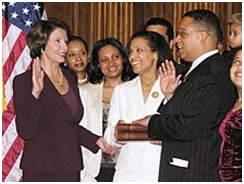 Keith Ellison of Minnesota, a Muslim, was elected to the House of Representatives on November 7, 2006, and sworn in on January 4, 2007. In a private replay of the official swearing-in on the House floor, he took his oath of office with his hand on the Qur’an. It was an English translation that once belonged to Thomas Jefferson and came from the Library of Congress.
Keith Ellison of Minnesota, a Muslim, was elected to the House of Representatives on November 7, 2006, and sworn in on January 4, 2007. In a private replay of the official swearing-in on the House floor, he took his oath of office with his hand on the Qur’an. It was an English translation that once belonged to Thomas Jefferson and came from the Library of Congress.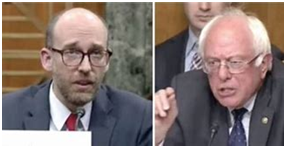 “This nominee is really not someone who is what this country is supposed to be about,” said the senator. “I will vote no.”
“This nominee is really not someone who is what this country is supposed to be about,” said the senator. “I will vote no.”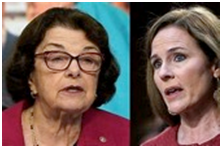 Fast-forward once again to December 2017, and Amy Coney Barrett is being questioned in the Senate Judiciary Committee for an appointment to the 7th Circuit Court of Appeals. Senator Diane Feinstein (D-CA) said,
Fast-forward once again to December 2017, and Amy Coney Barrett is being questioned in the Senate Judiciary Committee for an appointment to the 7th Circuit Court of Appeals. Senator Diane Feinstein (D-CA) said,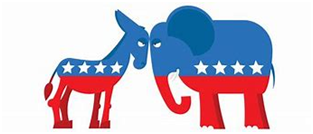 Political Shibboleths that
Political Shibboleths that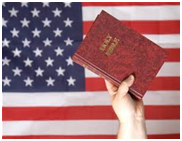 Replay: Looking back to the 2016 campaign
Replay: Looking back to the 2016 campaign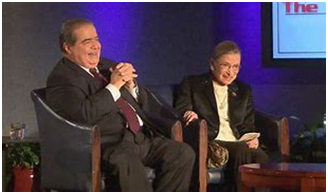 Justices Antonin Scalia & Ruth Bader Ginsburg:
Justices Antonin Scalia & Ruth Bader Ginsburg: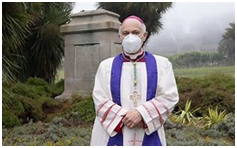 Catholic Archbishop Salvatore J. Cordileone
Catholic Archbishop Salvatore J. Cordileone Message of the Month
Message of the Month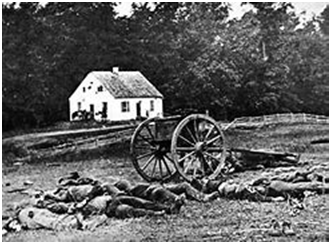
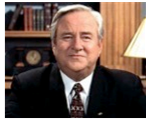 What Motivated Jerry Falwell
What Motivated Jerry Falwell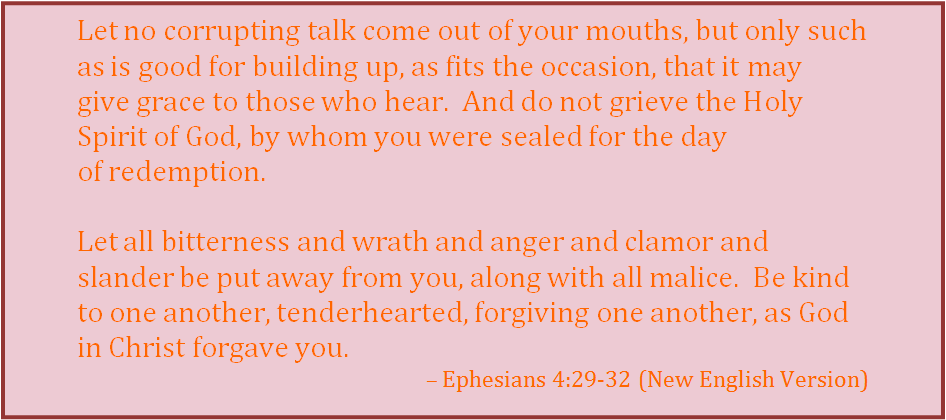 Contact me at: donaldshoemakerministries@verizon.net
Contact me at: donaldshoemakerministries@verizon.net